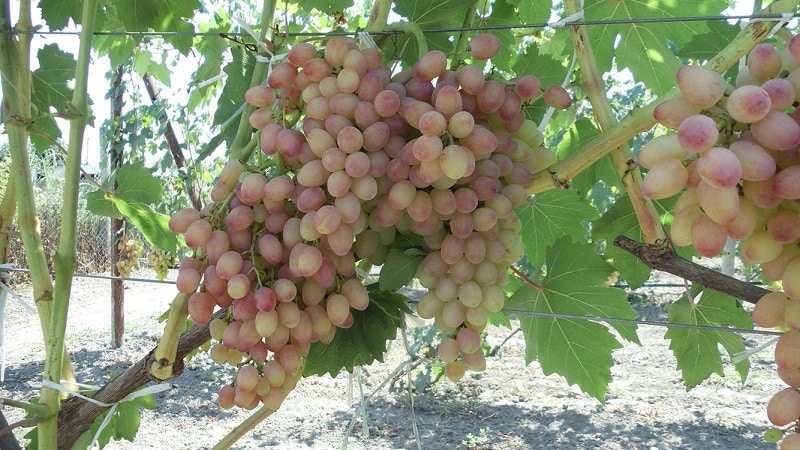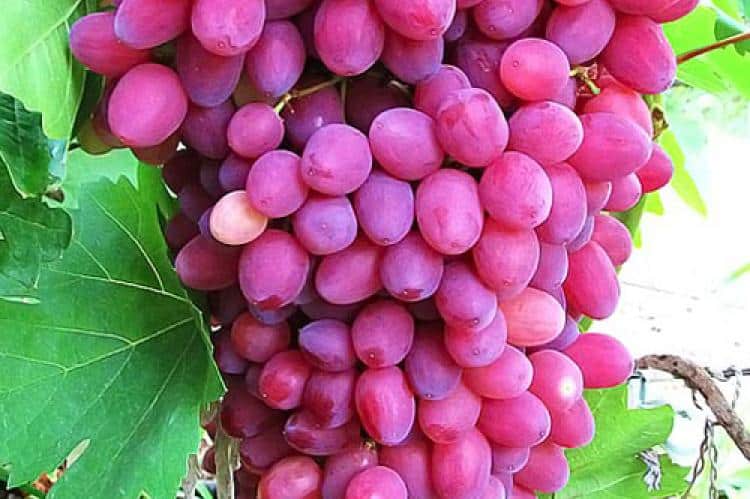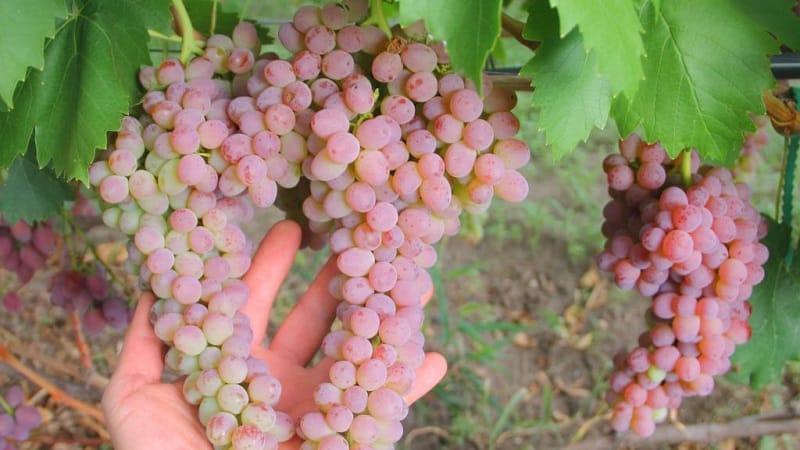Calorie content of sultana grapes and its beneficial properties for health
Among the many varieties of grapes, sultanas are one of the most popular. This is due not only to the absence of seeds, but also to the richness of the flavor palette. Sweet berries are distinguished by a special composition, thanks to which this variety is recommended even for baby food and disease prevention.
Calorie content of raisin grapes
Sweet seedless berries are quite high in calories, so people who are overweight adjust their intake of grapes.
Glycemic index
The glycemic index of sultanas is different for everyone. varieties. White grapes have a value of 44-58. Black berries have an index of 44-52. This indicator is considered average, so eating grapes does not have too much effect on changes in blood glucose levels.
Carbohydrates contained in berries are broken down at an average speed. However, the fruits do not provide a feeling of quick satiety, so they are consumed either as a dessert or as one of the ingredients in a salad or other dish.
BJU
The ratio of proteins, fats and carbohydrates is approximately the same in both light and black grapes - 4%: 2%: 100%.
Despite the fact that berries are rich in fructose, glucose and sucrose, you should not exclude them from your diet, as they contain complex compounds with pectin, fiber, starch and glycogen. Therefore, after eating the fruits, there is no too rapid release of sugar into the blood, which means that the body does not store subcutaneous fat for future use.
Composition and properties
Berries, rich in antioxidants, have a unique composition (per 100 g of product):
- dietary fiber - 1.6 g;
- water - 80.5 g;
- mono- and disaccharides - 15.4 g;
- organic acids - 0.8 g;
- polyunsaturated fatty acids - 0.2 g;
- saturated fatty acids - 0.2 g.
Kishmish contains vitamins A, C, E, H, PP, group B. Of the beneficial microelements, grapes are rich in potassium, boron, aluminum, rubidium, copper, calcium, and sodium.
Because light sultanas contains chlorophyll, and black contains resveratrol, both of these varieties are beneficial. Light berries are recommended for children, as they actively participate in metabolism. Black fruits are included in the diet of adults because they improve heart function.
Important! Berries grown on an industrial scale are treated with chemicals to prevent plant diseases. This product is soaked in cold water for 1-2 hours and then washed under running water.
How many calories in 100 g

Calorie content sultana depends on the degree of ripeness of the berries and does not differ too much variety varieties. Varies from 40 to 90 kcal.
In juice
The drink made from berries contains about 150 biologically active substances and is quickly absorbed by the body. His calorie content - 60 kcal per 100 ml. Juice increases the level of hemoglobin in the blood and enhances the function of hematopoiesis, but it is included in the diet with caution, especially for those losing weight.
Important! Freshly squeezed juice is diluted with mineral water, since it has high acidity.
In processed berries
When creating preparations, sugar syrups are often used. The energy value of canned berries in thick syrup is 40 kcal, and in jam - 190-300 kcal per 100 ml.
Dried berries - raisins from sultanas grapes.It has a balanced soft taste and delicate aroma. This is a high-calorie product (279-320 kcal per 100 g), but when properly prepared it retains almost all useful substances and microelements.
Is it possible to eat raisin grapes on a diet?

In the fight against extra pounds, sultanas become a useful ally if you know the rules for using the product. It's easy to diversify a boring diet with the help of grapes.
Recommendations for those who are losing weight:
- with a grape mono-diet, it is permissible to eat from 0.5 to 1.5 kg of berries;
- with any other diet option, grapes will not cause harm if you eat 50-100 g daily;
- in the diet menu, replace fruit salads with 1-2 handfuls of grapes.
Those losing weight must drink at least 1.5-2 liters of pure water or green tea per day to help the body cleanse itself of toxins and enhance the beneficial effects of sultanas.
Important! Consider the diuretic effect of grapes. It is recommended to eat it no later than 2-3 hours before bedtime.
Benefits and harms
Eating grapes with their skins helps burn fat. Therefore, it is often included in the menu instead of high-calorie flour desserts.
Benefits of sultanas when consumed regularly:
- cosmetic effect - it is provided by flavonoids and antioxidants that slow down the aging process;
- the vitamin composition has a pronounced anti-inflammatory effect;
- The product is indispensable for baby food because it strengthens the immune system and rarely causes allergies;
- Grapes have a healing effect on the cardiovascular system.
The product causes bloating and flatulence if consumed in excess. It is better to eat sultanas as a snack between main meals.You should not eat berries at the same time as dairy products, otherwise it will cause stomach upset.
Contraindications
Patients with diabetes mellitus, cholecystitis and pancreatitis should not eat sultanas. Grapes should be used with caution for stomach ulcers.
Grape juice can corrode tooth enamel, so after eating the berries, be sure to rinse your mouth with warm water.
How to choose and store correctly

Only ripe berries of good quality can bring maximum benefits to the body.
To choose the right product, follow our expert advice:
- choose berries with smooth, elastic skin without damage;
- a white coating on the surface of the fruit is normal;
- berries falling off the bunch are a sign of a stale product;
- The sultana season begins at the end of July and ends in September - this is the best period for purchasing.
Grapes are well stored, but they need to be packaged in “breathable” materials - paper, light fabric. Temperature conditions for long-term storage are not higher than +3...+5°C in a dry place.
Important! It has been noticed that dark grape varieties last longer than light ones.
Consumption norms per day

In a normal diet, it is allowed to replace one of the dessert options with fresh grapes and eat about 200 g of them per day. This amount will not harm a healthy body.
Dry sultanas contain a lot of calories, so it is recommended to eat 20-25 pieces. per day to get maximum benefits. Since raisins have little fiber, a small handful will help restore strength and improve the functioning of the gastrointestinal tract even after poisoning or heavy meals with heavy food.
Conclusion
It is wrong to think that because of its richly sweet taste, sultanas should not be eaten by children and those who are trying to lose weight. The glycemic index of the product allows it to be included fresh in the diet even for those who are on a diet.
Dried and canned berries are high in calories, but in small quantities they will not cause harm, since they are rich in vitamins and microelements.